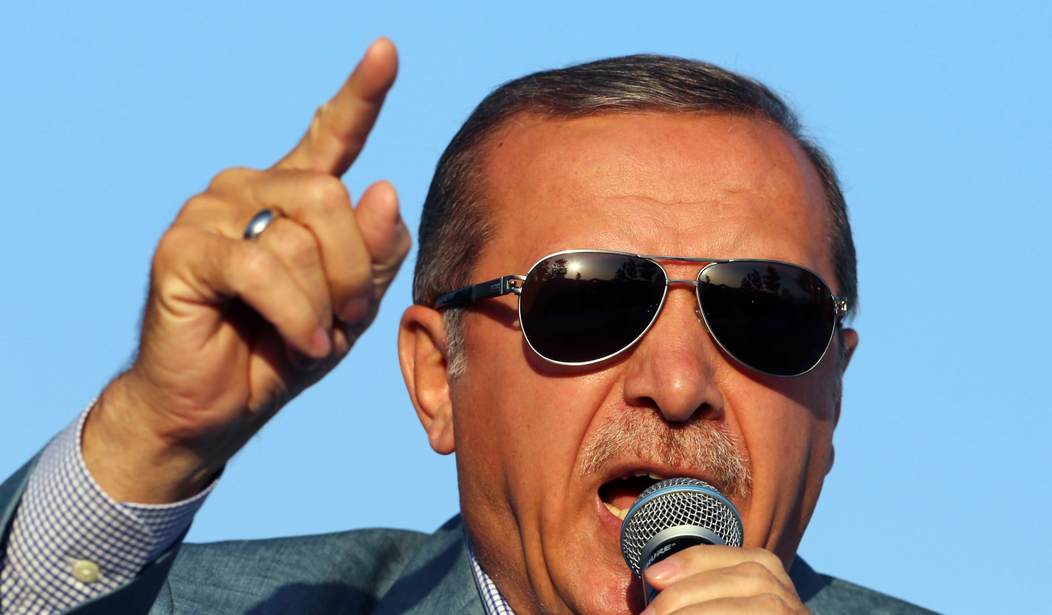Last night (local time) something terrible happened. As Rick Moran explains for PJ Media, an ISIS suicide terrorist blew himself up at a wedding in the city of Gaziantep. At least 50 people were killed, an additional 100 partygoers were wounded.
After this terrible attack, Turkish President Recep Tayyip Erdogan went out of his way to — rightfully — condemn the radical Islamic mass murderers of ISIS. Deputy Prime Minister Mehmet Simsek did the same, saying:
This was a barbaric attack. It appears to be a suicide attack. All terror groups, the PKK, Daesh, the (Gulen movement) are targeting Turkey. But God willing, we will overcome.
Although that’s all true, and although it’s rather refreshing that the Erdogan regime is condemning ISIS in no uncertain terms, both Erdogan and Simsek conveniently forget to mention that ISIS benefited tremendously from Erdogan’s policies in Syria and the rest of the Middle East. As Ben Norton writes at Salon.com:
Turkish President Recep Tayyip Erdoğan has long been accused of indirectly and even directly helping ISIS and other extremist groups in Syria, in their fights against Kurdish rebels and Syrian dictator Bashar al-Assad.
For years, Turkey — a U.S. ally and NATO member — let ISIS and other violent Salafi (Sunni extremist) groups cross its open border with Syria, which some dubbed the “jihadi highway.”
A former ISIS member told Newsweek in 2014 that the so-called Islamic State saw Turkey as its ally. He explained that heavily armed ISIS fighters were allowed to freely cross the NATO member’s border, and “ISIS commanders told us to fear nothing at all because there was full cooperation with the Turks.”
The ex-ISIS militant said he “connected ISIS field captains and commanders from Syria with people in Turkey on innumerable occasions,” and added that ISIS commanders “mostly spoke in Turkish because the people they talked to were Turkish officials.”
Even Russia Today weighed in earlier this year:
Evidence over Turkey’s alleged links with ISIS keeps emerging. But will there be a high-level international investigation? Will we hear criticism from Ankara’s Western partners about what is going on? RT has obtained exclusive evidence of Turkey’s alleged dealings with Islamic State (IS, formerly ISIS/ISIL). Russia also provided information, including satellite imagery of ISIS oil convoys crossing into Turkey.
And then there’s this report from Newsweek:
It’s not just a matter of jihadis from more than 100 countries transiting through Turkey, often unmolested, to join ISIS. Blaming poor border security doesn’t cut it when journalists have photographed Turkey’s intelligence service actively supporting and supplying ISIS.
Rather, it’s the fact that Turkey provides visa waivers, or issues visas on demand, for citizens of countries that contribute to ISIS. Demand that visitors under the age of 40 get visas in advance and the flow of foreign fighters into Syria would slow to a trickle.
The basic problem with Erdoğan, however, is he does not believe radical Sunni militancy exists. Even when ISIS fighters took hostage 49 Turkish diplomats and truck drivers in Mosul, Iraq, Erdoğan bent over backward to avoid calling the hostage-takers terrorists, both before and after the diplomats’ release.
ISIS, then, is very much a problem of Erdogan’s own making. It’s time for the international community, and especially Turkey’s NATO allies, to call him out on it and to confront him and Turkish voters with the cold, hard truth: ISIS would never have been as big and dangerous as it is now if Turkey had done everything in its power to suppress the terror group from day one.









Join the conversation as a VIP Member